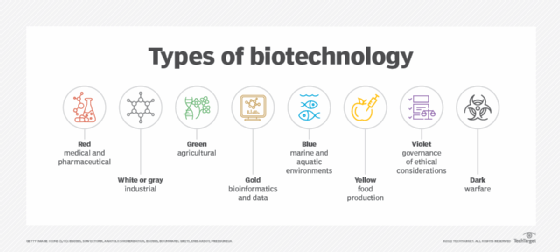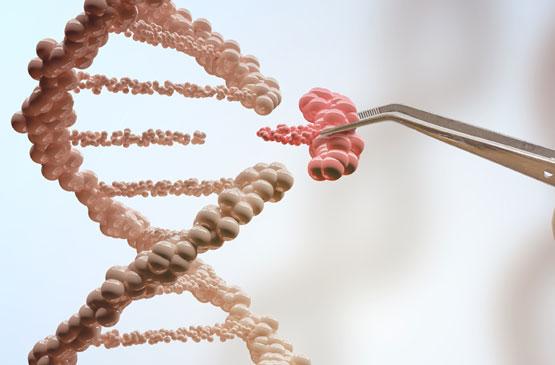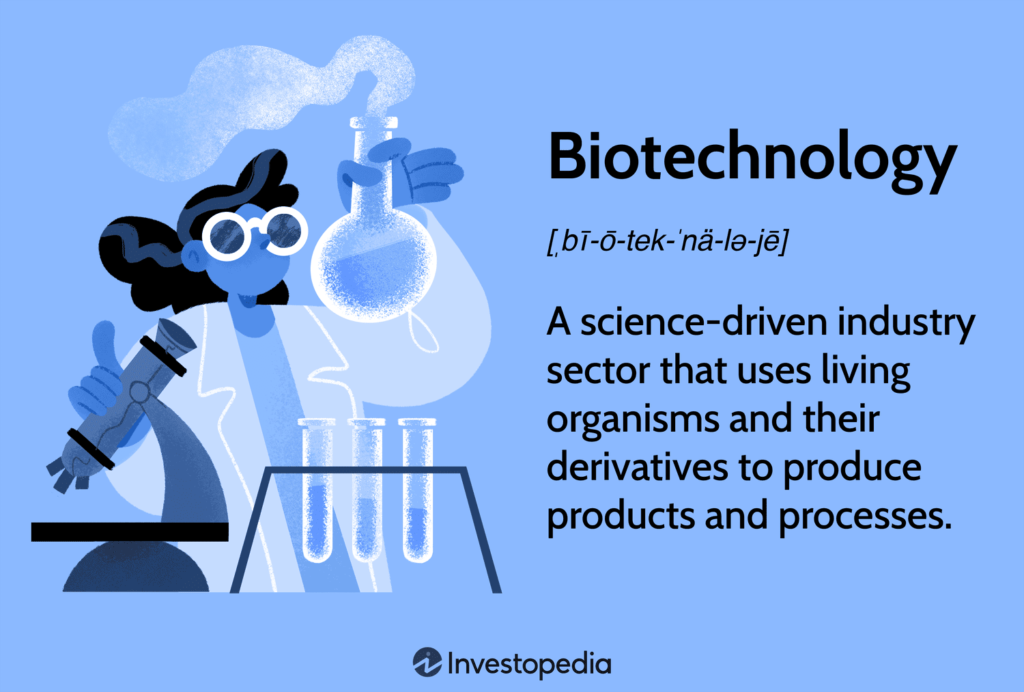Biotechnology uses living organisms or systems to develop products and technologies for human benefit. It combines biology with technology.
Biotechnology has revolutionized various sectors, including healthcare, agriculture, and environmental science. It enables the creation of genetically modified crops that resist pests and diseases, improving food security. In medicine, biotechnology has led to the development of innovative treatments, vaccines, and diagnostic tools, enhancing patient care and disease management.
Environmental applications include bioremediation, which uses microorganisms to clean up polluted environments. With ongoing research and advancements, biotechnology continues to offer promising solutions to some of the world’s most pressing challenges, driving progress and innovation across multiple fields.

Credit: www.techtarget.com
Introduction To Biotechnology In Healthcare
Biotechnology is changing healthcare. It uses living systems to improve health. This field makes new treatments and medicines. It helps doctors diagnose diseases better. Biotechnology is making healthcare more efficient and effective.
The Dawn Of A New Era
Biotechnology is starting a new era in healthcare. It brings hope for better treatments. Scientists can now work with genes and cells. This helps them find cures for diseases. Gene therapy is one such example. It fixes defective genes to treat diseases.
Another exciting area is personalized medicine. This tailors treatments to individual patients. It looks at a person’s genetic makeup. This makes treatments more effective and with fewer side effects.
Key Drivers Behind Biotech Advancements
Several factors drive biotech advancements. Technology is one major driver. New tools and machines help scientists. They can now study cells and genes in detail. This leads to new discoveries and treatments.
Funding also plays a big role. Governments and private companies invest in biotech research. This money helps scientists work on big projects. It speeds up the development of new treatments.
Collaboration is another key driver. Scientists from different fields work together. This leads to new ideas and solutions. Biotech companies also partner with hospitals and universities. This brings research from the lab to the patient.
| Drivers | Impact |
|---|---|
| Technology | Enables detailed study of cells and genes |
| Funding | Speeds up research and development |
| Collaboration | Brings new ideas and solutions |
Biotechnology is transforming healthcare. It brings new hope and better treatments. The future looks bright with these advancements.

Credit: www.bio.org
Gene Editing: A Gateway To Curing Genetic Diseases
Gene editing promises to transform healthcare. Scientists can now alter DNA to fix genetic errors. This can help cure diseases passed down through generations. Let’s explore how gene editing can change lives.
Crispr-cas9: Rewriting The Code Of Life
CRISPR-Cas9 is a groundbreaking tool in gene editing. It acts like a pair of molecular scissors. Scientists use CRISPR to cut DNA at specific locations. This allows them to add, remove, or change DNA segments.
CRISPR-Cas9 has many advantages. It is precise, cost-effective, and easy to use. Researchers believe it can cure diseases like cystic fibrosis, sickle cell anemia, and Huntington’s disease. The potential is enormous.
| Disease | Potential Cure |
|---|---|
| Cystic Fibrosis | CRISPR can fix the faulty gene causing the disease |
| Sickle Cell Anemia | CRISPR can correct the gene mutation in blood cells |
| Huntington’s Disease | CRISPR can remove the harmful gene sequences |
Ethical Considerations And Future Prospects
Ethical considerations are crucial in gene editing. Changing DNA can have unforeseen effects. There are concerns about “designer babies”. This is the idea of editing genes for traits like height or intelligence.
Governments and scientists must work together. They need to ensure gene editing is safe and ethical. Public awareness and education are essential. People should understand the benefits and risks of gene editing.
The future of gene editing is promising. It can eliminate many genetic diseases. With careful regulation, it can lead to a healthier world.
Personalized Medicine: Tailored Treatments For Patients
Personalized medicine uses biotechnology to create treatments for each patient. This approach considers unique genetic makeup, lifestyle, and environment. It aims to provide the most effective treatment.
The Role Of Genomics
Genomics studies an individual’s DNA to understand their health. By analyzing genes, doctors can predict how a patient will respond to treatments. This helps in choosing the best drug and dosage for each person.
For example, genomics can identify if a patient has a gene that makes them resistant to certain medications. This information ensures that they receive a drug that will work for them.
Success Stories And Challenges Ahead
There have been many success stories in personalized medicine. For instance, cancer patients have received treatments tailored to their tumor’s genetic profile. This has led to better outcomes and fewer side effects.
- Breast cancer treatments based on genetic markers
- Customized therapies for cystic fibrosis patients
- Targeted drugs for specific types of leukemia
Despite these successes, there are challenges. One major challenge is the high cost of genetic testing and personalized drugs. Another is the need for more research to understand the vast amount of data generated by genomic studies.
There are also ethical concerns about genetic privacy and discrimination. It is crucial to address these issues to ensure that personalized medicine benefits everyone.

Credit: www.ourcrowd.com
Biopharmaceuticals: Revolutionizing Drug Development
Biopharmaceuticals are changing the world of medicine. They offer new ways to treat diseases. These advanced drugs are made from living organisms. They bring hope to many patients.
From Traditional To Biologic Drugs
Traditional drugs are made using chemicals. They are simple and easy to produce. But they often have side effects.
Biologic drugs are different. They are made from living cells. These cells can be from humans, animals, or microorganisms.
Biologic drugs can target diseases more precisely. They are complex but very effective. They include vaccines, blood components, and gene therapies.
Impact On Chronic Diseases Treatment
Biopharmaceuticals have a big impact on chronic diseases. These are diseases that last a long time.
Here are some examples:
- Diabetes: Insulin is now made using biopharmaceutical methods.
- Cancer: New drugs target cancer cells directly.
- Rheumatoid Arthritis: Biologic drugs reduce inflammation effectively.
These drugs improve the quality of life. They offer new hope to patients. They can be more expensive but are worth the cost.
| Traditional Drugs | Biologic Drugs |
|---|---|
| Simple chemicals | Living cells |
| Easy to produce | Complex production |
| More side effects | Targeted treatment |
Regenerative Medicine: The Promise Of Tissue Engineering
Regenerative medicine is a groundbreaking field in biotechnology. It aims to repair or replace damaged tissues and organs. Tissue engineering plays a crucial role in this. By using cells and biomaterials, scientists create new tissues. This promises a future where damaged body parts can be replaced.
Stem Cells At The Forefront
Stem cells are unique cells with the ability to transform into any cell type. They are essential in regenerative medicine. Scientists harvest stem cells from various sources. These include bone marrow, umbilical cord blood, and even fat tissue. Researchers then guide these cells to grow into specific tissue types.
Stem cells can repair damaged tissues. For example, they can help regenerate heart muscles after a heart attack. They are also crucial for treating spinal cord injuries. The versatility of stem cells is unparalleled. This makes them a powerful tool in medical research.
Organ Regeneration And The Future Of Transplants
Organ regeneration is a major focus in tissue engineering. Scientists aim to grow organs in the lab. This could solve the problem of organ shortages. Many people die waiting for organ transplants. Lab-grown organs could save many lives.
Researchers use a combination of cells and scaffolds to create organs. Scaffolds provide structure for the cells to grow on. Over time, the cells form functional tissues and organs. This technology is still in its early stages. But it shows great promise.
| Organ | Potential Regeneration Methods |
|---|---|
| Heart | Stem cells, 3D bioprinting |
| Liver | Cell transplantation, tissue scaffolding |
| Kidney | Stem cells, bioartificial devices |
In the future, organ regeneration could become common. This would make transplants safer and more accessible. Patients would no longer need to wait for a donor. Instead, their own cells could be used to grow new organs.
The potential of tissue engineering and regenerative medicine is immense. By harnessing the power of stem cells and innovative techniques, we can revolutionize healthcare.
Synthetic Biology: Constructing Life For Better Health
Synthetic biology is a groundbreaking field. It involves designing and creating new biological parts. This technology helps in solving health problems. Scientists can build new organisms. They can even redesign existing ones. The goal is to improve health and treat diseases.
Building Blocks Of Synthetic Biology
Synthetic biology uses DNA, proteins, and cells as building blocks. Scientists can manipulate these components. They create new biological systems. This process involves using genetic engineering techniques. It also requires bioinformatics tools. These tools help in designing and modeling new life forms.
| Building Block | Function |
|---|---|
| DNA | Carries genetic instructions |
| Proteins | Perform various cellular functions |
| Cells | Basic units of life |
Applications In Healthcare And Ethics
Synthetic biology has many applications in healthcare. It helps in creating new drugs. These drugs can target specific diseases. It also aids in developing personalized medicine. This type of medicine is tailored to individual patients. Another application is in creating artificial organs.
- New drugs
- Personalized medicine
- Artificial organs
There are ethical concerns in synthetic biology. One concern is about biosecurity. The technology can be misused. Another concern is about genetic privacy. People worry about how their genetic data is used. It’s important to address these concerns. This will ensure the safe use of synthetic biology.
The Role Of Ai And Machine Learning In Biotech
In the fast-paced world of biotechnology, AI and Machine Learning are game changers. These technologies drive innovation, boost efficiency, and open new possibilities. They help scientists and researchers solve complex problems swiftly.
Accelerating Research And Development
AI and Machine Learning accelerate research and development. They automate repetitive tasks, freeing up valuable time for scientists. AI algorithms quickly analyze large datasets, identifying patterns and anomalies. This speed enhances the discovery of new drugs and therapies.
Machine Learning models predict how molecules will behave. This prediction saves time and resources in drug development. Researchers can focus on the most promising candidates, reducing trial and error. AI also helps in optimizing manufacturing processes, ensuring consistency and quality.
Predictive Analytics In Personalized Medicine
Predictive analytics powered by AI transforms personalized medicine. It analyzes genetic data to predict disease risk. Doctors use this information to create custom treatment plans. Patients receive therapies tailored to their unique genetic makeup.
AI identifies which patients will benefit from specific treatments. This precision reduces side effects and improves outcomes. Personalized medicine becomes more efficient and effective.
Below is an example of how AI and Machine Learning contribute to biotech:
| Area | Impact of AI/ML |
|---|---|
| Drug Discovery | Faster identification of potential compounds |
| Genomics | Accurate analysis of genetic information |
| Clinical Trials | Efficient patient selection and monitoring |
AI and Machine Learning revolutionize biotechnology. They bring unprecedented speed and accuracy to research. Personalized medicine benefits immensely from these technologies. The biotech landscape is changing rapidly, driven by AI advancements.
Challenges And Ethical Considerations
Biotechnology offers groundbreaking solutions in medicine, agriculture, and environmental protection. Yet, it faces significant challenges and ethical considerations. Addressing these issues is crucial for responsible innovation.
Navigating The Moral Landscape
The moral implications of biotechnology are vast and complex. Scientists must consider the long-term impacts of their work. For instance, genetic engineering can save lives but also poses ethical dilemmas. Is it right to alter human genes?
Animal testing is another ethical concern. While it advances medical research, it raises animal rights issues. Balancing progress and ethics is a constant challenge.
Moreover, biotechnological advances can widen social inequalities. Access to these innovations is often limited to wealthy nations. This creates a moral obligation to ensure fair distribution.
Regulatory Hurdles And Public Perception
Biotechnology must navigate a complex regulatory landscape. Different countries have varying laws and standards. This makes international collaboration challenging. For example, the approval process for genetically modified organisms (GMOs) varies widely.
Public perception also plays a significant role. Many people are skeptical about biotechnology. They worry about the safety and ethical implications. Building public trust is essential for widespread acceptance.
Effective communication is key. Scientists and policymakers must educate the public. Transparent practices and clear information can help build trust.
| Challenge | Details |
|---|---|
| Ethical Dilemmas | Genetic engineering, animal testing, social inequalities |
| Regulatory Hurdles | Varying laws and standards, complex approval processes |
| Public Perception | Safety concerns, ethical implications, lack of trust |
Addressing these challenges is crucial for the future of biotechnology. Ethical considerations and regulatory compliance must go hand-in-hand. Only then can we harness the full potential of this transformative field.
Conclusion: The Future Is Now
Biotechnology is transforming our world. It’s changing healthcare, agriculture, and environmental sustainability. The future of biotechnology is happening right now. This journey is exciting and filled with possibilities.
Integrating Biotech Into Everyday Healthcare
Biotechnology is making healthcare better. Personalized medicine is one of the biggest breakthroughs. Doctors can now tailor treatments to individual patients. This means better outcomes and fewer side effects.
Biotech also improves diagnostics. New tests can detect diseases earlier. Early detection saves lives and reduces costs. Vaccines are another success story. Biotech has led to faster and more effective vaccines.
Telemedicine uses biotech for remote patient monitoring. Patients can stay at home and still get excellent care. Wearable devices track vital signs in real-time. This data helps doctors make better decisions.
The Ongoing Journey Of Discovery
Biotechnology is always advancing. Scientists discover new things every day. Gene editing is a field with immense potential. CRISPR technology can fix genetic defects. This could cure many genetic diseases.
Stem cell research offers hope for many. It can regenerate damaged tissues. This could revolutionize treatments for conditions like Parkinson’s and spinal cord injuries.
Environmental biotechnology is also promising. Biotech can help clean up pollution. It can create biofuels that are sustainable. This helps protect our planet for future generations.
| Biotech Application | Impact |
|---|---|
| Personalized Medicine | Better outcomes, fewer side effects |
| Early Diagnostics | Saves lives, reduces costs |
| Vaccines | Faster, more effective |
| Telemedicine | Remote monitoring, better care |
| Gene Editing | Cures genetic diseases |
| Stem Cell Research | Regenerates tissues |
| Environmental Biotech | Cleans pollution, creates biofuels |
Biotechnology is a journey. Each step brings new discoveries. The future is bright and full of potential. Stay tuned for more exciting developments in this field.
Frequently Asked Questions
What Is Biotechnology?
Biotechnology is the use of living organisms or systems to develop products. It combines biology and technology to improve health, agriculture, and industry.
How Does Biotechnology Work?
Biotechnology manipulates biological systems to create or enhance products. Techniques include genetic engineering, fermentation, and cell culture. It aims to solve problems in various fields.
What Are The Applications Of Biotechnology?
Biotechnology is used in medicine, agriculture, and environmental protection. It develops drugs, improves crops, and creates biofuels. Its applications are vast and growing.
Is Biotechnology Safe?
Biotechnology is generally safe when regulated. Strict guidelines and testing ensure products are safe for humans and the environment. Continuous monitoring is essential.
Conclusion
Biotechnology shapes the future of medicine, agriculture, and environmental sustainability. Its innovations promise a healthier, greener world. Embracing biotech advancements can lead to groundbreaking solutions. Stay informed and support ethical practices in this field. The future holds immense potential for those who harness the power of biotechnology.

